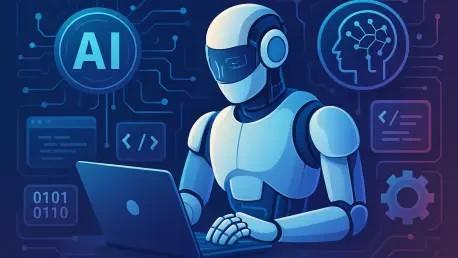The integration of artificial intelligence (AI) into the field of computer science is simultaneously sparking innovation and stirring debate. In a world driven by digital transformation, AI remains a focal point in discussions around technological advancement and employment dynamics. Contrary to fears of job displacement, AI is increasingly recognized as an enhancer rather than a replacement for computer scientists. This analysis delves into the shifting paradigm, highlighting how AI complements and extends the capabilities of human professionals, reshaping market strategies across industries.
Setting the Stage for AI-Centric Evolution
AI’s emergence has significantly influenced computing landscapes, reminiscent of past technological milestones like the digital computing revolution. Understanding this continuum is critical for contextualizing AI’s impact on computer science. AI technologies, ranging from machine learning to automated systems, have been transformational, introducing new dimensions of problem-solving and efficiency. This historical perspective underscores the need for a nuanced view of AI’s current and future implications in the professional sphere of computer science.
Analyzing AI’s Augmentation of Computer Scientist Roles
Propelling Innovation Through Advanced Tools
AI offers remarkable potential as a catalyst for innovation within computer science, significantly impacting sectors like healthcare and financial services through improved data processing and algorithmic efficiency. While AI enhances speed and creativity in operations, human expertise remains indispensable for nuanced decision-making and underscoring ethical considerations. A focus on case studies within specific industries showcases AI’s complementary role and highlights the collaborative nature of human-AI interactions in various settings.
Extending Research and Development Frontiers
The advent of AI has broadened the horizons of computer science, facilitating complex problem-solving through predictive analytics and sophisticated simulations. Notably, cybersecurity is a burgeoning field where AI’s capabilities manifest in tangible security advancements. Critical insights are also emerging around ethical concerns and data privacy, which present challenges that necessitate a balanced approach. Mitigating risks while capitalizing on AI’s potential requires careful navigation, integrating AI technologies responsibly into workflows.
Adapting to Global and Industry-Specific Variances
AI’s impact varies significantly across geographic regions and sectors, influencing adoption rates based on technological maturity, regulatory landscapes, and market dynamics. Certain industries have experienced remarkable innovations spurred by AI, whereas others face hurdles due to economic or infrastructural barriers. Given these disparities, challenging prevalent misconceptions remains vital, cultivating an informed understanding of AI’s role in industry-specific contexts and the need for human oversight.
Projecting Future Trajectories in Computer Science
The trajectory of computer science is poised for transformation through AI-driven innovations that are scaling across the profession. This transition is expected to redefine career structures, ushering in novel professional roles that leverage combined human intelligence and AI capabilities. Thought leaders foresee an integrated future where new career pathways and advances thrive, characterized by collaboration between AI technologies and human ingenuity, fundamentally altering the scope of computer science.
Implementing Strategic Adaptations for Maximized Impact
As AI continues reshaping industry practices, its integration calls for strategic adaptations across sectors. Businesses, by refining operational methodologies through insights gained from AI applications, can harness these tools for effective outcomes. Emphasizing best practices and actionable strategies fosters a synergy between AI capabilities and human expertise, promoting innovation while ensuring sustainability. Ensuring stakeholders are equipped with the knowledge to capitalize on AI can drive significant improvements across diverse domains.
Reflecting on Insights and Future Directions
Reflecting on AI’s integration into computer science reveals its robust role as an enabler of capabilities, catalyzing further innovation rather than threatening human professionals. While AI technologies herald new operational methodologies and complexities, the core requirement for human oversight and decision-making does not diminish. Therefore, embracing AI’s possibilities with informed strategies can lead to a vibrant and evolving technological ecosystem. As the market progresses, stakeholders are advised to nurture human-AI partnerships, providing a dynamic environment for growth and adaptation in the digital age.









